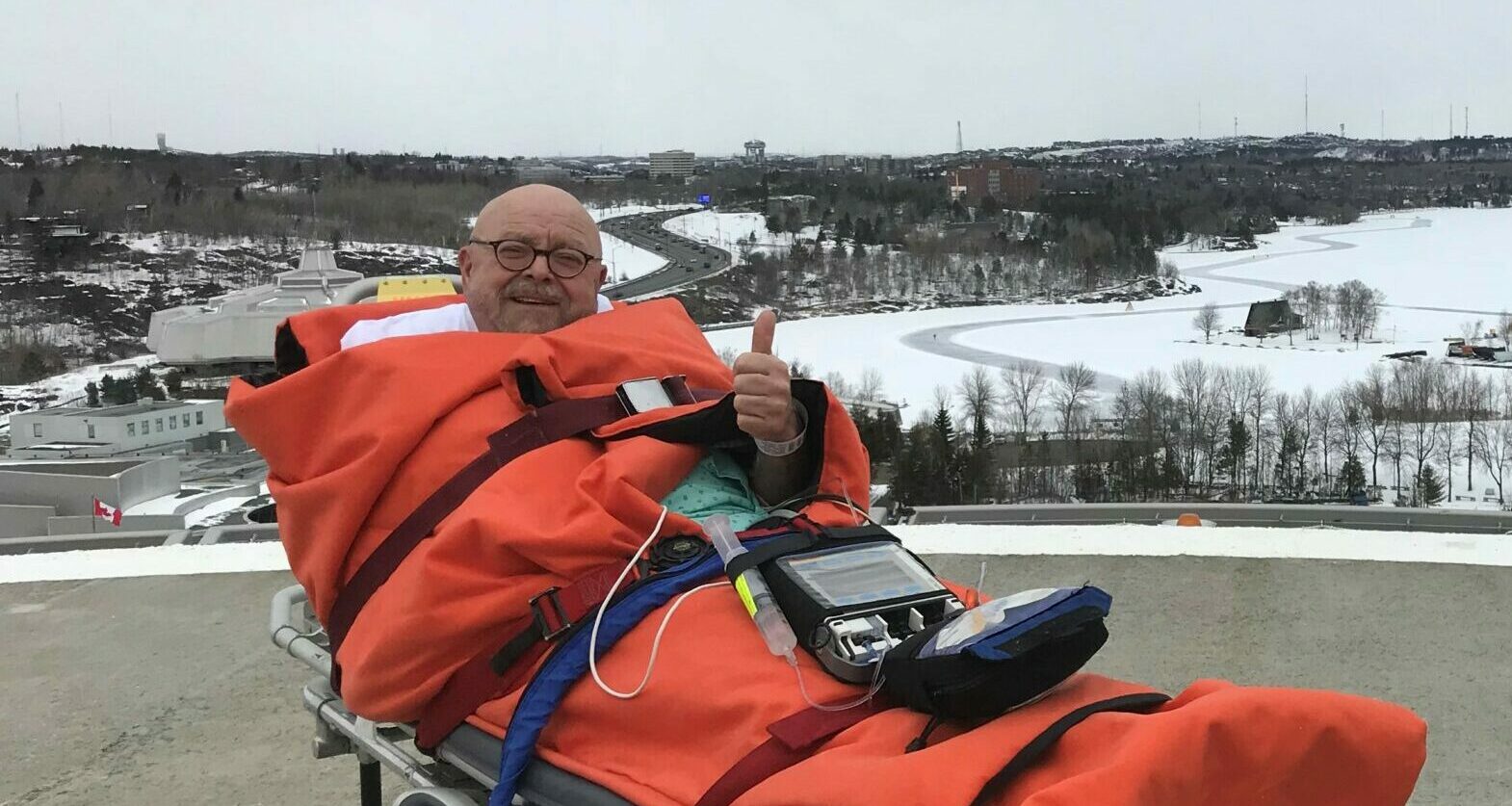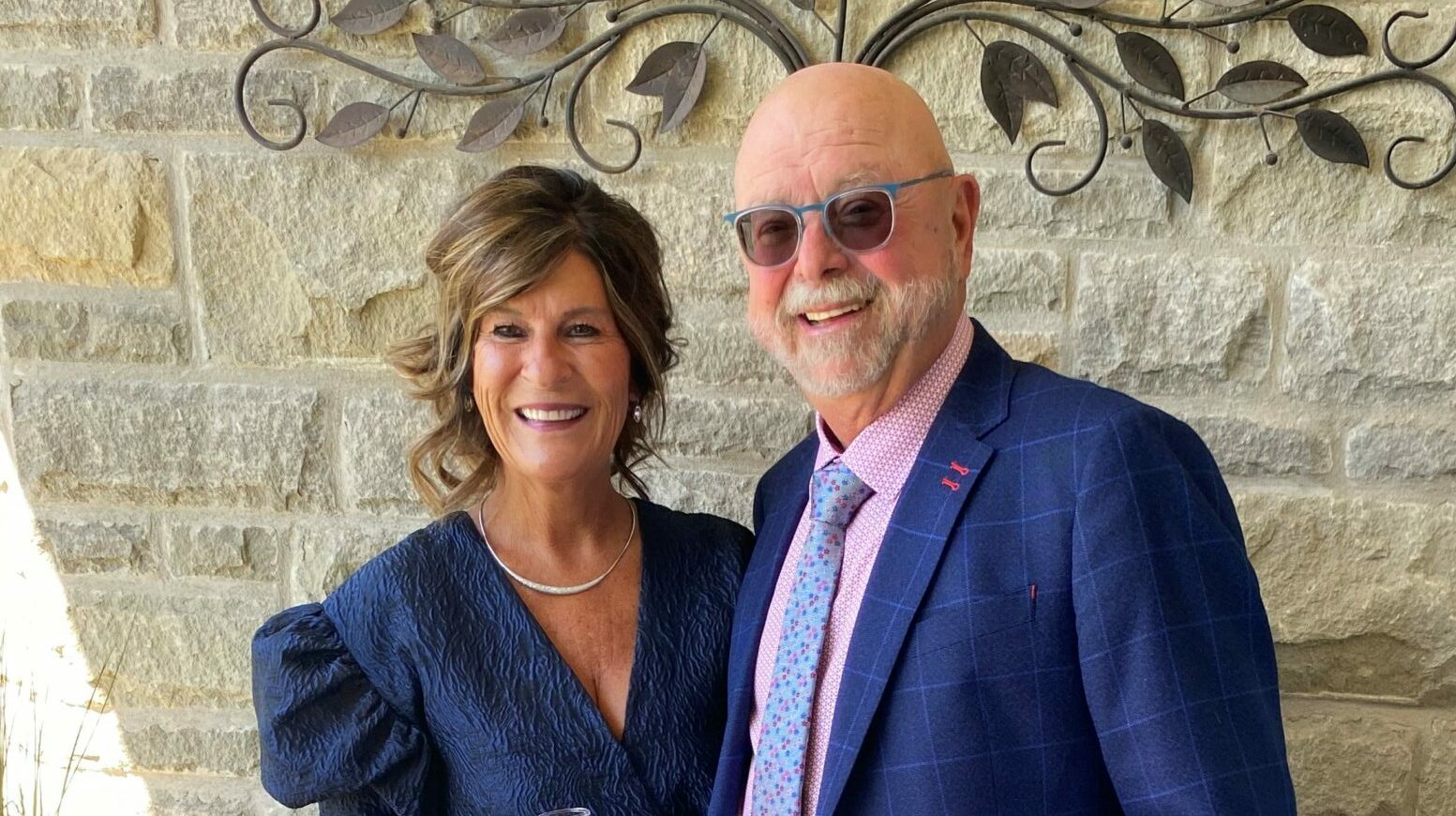Patient Story: John


After enjoying a weeklong snowmobile trip in Quebec, John Mitchell’s drive home to Southern Ontario took to an unexpected turn when he began feeling ill and was starting to lose his vision. He managed to pull the vehicle and trailer full of snowmobiles off the road in Latchford, ON, before he collapsed over the steering wheel. His friend, Rob, who was travelling with him, had called 9-1-1 and an ambulance was dispatched from north of New Liskeard.
While in the ambulance, John’s heart rate soared to a dangerously high rate of 265 beats per minute. Once they arrived at the Medical Centre, staff were able to regulate his heart rate, and the next step was to get John to a hospital with specialized cardiac care. As soon as the weather cleared, John was flown to Health Sciences North (HSN) where he began treatment by cardiologist, Dr. Costa-Vitali.
After some testing, John was diagnosed with arterial fibrillation, irregular and rapid heartbeat, and tachycardia which caused his rapid heart rate. John’s treatment was to have a defibrillator placed in his chest attached to his heart, however, he was a little hesitant at first.
“The idea of having this major surgery was very overwhelming,” John said. “But Dr. Costa-Vitali took expert care of myself and my wife, Veronica. We felt that we we’re in good hands and little did I know this would save my life, again.”
Before he was discharged from HSN, John underwent an echocardiogram (ECHO), also known as a Cardiovascular Ultrasound. The ECHO caught a blood clot in John’s heart, which would have been life-threatening if left untreated.
Nearly two years later, after retuning home from his cottage, John was hit with a shock in his chest. Without being able to comprehend what had just happened, he was shocked again before going unconscious. When John woke up in hospital, he learned that the defibrillator went off four times.
“I am very lucky to be alive,” John said. “My outcome would have been different had I not had a defibrillator placed in my heart. So many pieces came together to save my life; the quick response, the staff, the ECHO, the surgery performed at HSN. I am thankful to have been given the chance to continue to defy the odds.”
Today, John is doing well and has recently moved to Northeastern Ontario. He enjoys spending time with Veronica and continues to receive follow-up cardiac care at HSN. John and Veronica feel honoured to give back to HSN for the life-saving impact it had on their lives and encourage others to give back as well.
When you donate to Cardiac Care Month, you’re ensuring that more patients, like John, have access to state-of-the-art medical equipment, right here in Northeastern Ontario.
Après avoir profité d’un voyage en motoneige d’une semaine au Québec, John Mitchell rentrait chez lui en automobile dans le sud de l’Ontario lorsque sa vie a pris un tournant inattendu. Il a commencé à se sentir mal et à perdre la vue. Il a réussi à arrêter l’automobile et la remorque pleine de motoneiges à un gite touristique à Latchford, en Ontario, avant de s’écrouler sur le volant. Son ami Rob, qui voyageait avec lui, a composé le 9-1-1 et une ambulance a été dépêchée depuis le nord de New Liskeard.
Pendant qu’il se trouvait dans l’ambulance, son rythme cardiaque a grimpé rapidement pour atteindre un taux dangereusement élevé de 265 battements par minute. Une fois arrivé au centre médical, le personnel a pu régulariser son rythme cardiaque. La prochaine étape était de transférer John à un hôpital offrant des soins cardiaques spécialisés. Dès que le temps s’est éclairci, John a été transporté par voie aérienne à Horizon Santé-Nord (HSN) où le Dr Costa-Vitali, cardiologue, a commencé son traitement.
Après avoir passé quelques examens, John a reçu le diagnostic de fibrillation auriculaire, un rythme cardiaque rapide et irrégulier, et de tachycardie qui a causé l’accélération de son rythme cardiaque. Son traitement consistait à implanter sans sa poitrine un défibrillateur relié à son cœur, toutefois, John était un peu hésitant au début.
« La pensée de subir cette chirurgie importante était accablante, affirme John. Mais le Dr Costa-Vitali m’a traité ainsi que ma femme Veronica aux petits oignons. Il nous a semblé que nous étions entre de bonnes mains et j’étais loin de me douter que cela me sauverait la vie, encore une fois. »
Avant de quitter HSN, John a passé un échocardiogramme (ECHO), aussi connu sous le nom d’échographie cardiovasculaire. L’examen a révélé la présence d’un caillot de sang dans le cœur de John qui aurait mis sa vie en danger s’il n’était pas traité.
Près de deux ans plus tard, après être retourné chez lui de son chalet, Il a reçu un choc à la poitrine. Sans savoir ce qui venait de lui arriver, il a reçu un deuxième choc avant de perdre conscience. Lorsqu’il s’est réveillé à l’hôpital, il a appris que le défibrillateur avait délivré un choc quatre fois.
« Je suis très chanceux d’être en vie, ajoute-t-il. Le résultat aurait été différent si un défibrillateur n’avait pas été implanté dans ma poitrine. Tant d’éléments se sont réunis pour me sauver la vie; la réaction rapide du personnel, l’ECHO, la chirurgie effectuée à HSN. Je suis reconnaissant d’avoir eu la possibilité de continuer à défier le sort. »
Aujourd’hui, John va bien et a récemment déménagé dans le Nord-Est de l’Ontario. Il aime passer du temps avec Veronica et continue de recevoir des soins de suivi à HSN. John et Veronica se sentent privilégiés de pouvoir redonner à HSN pour les soins qui ont eu un effet si important sur leur vie et encouragent les autres à faire de même.
Lorsque vous faites un don à la campagne Mois des soins cardiaques, vous vous assurez que plus de patients comme John ont accès à de l’équipement ultramoderne, ici même dans le Nord-Est de l’Ontario.
